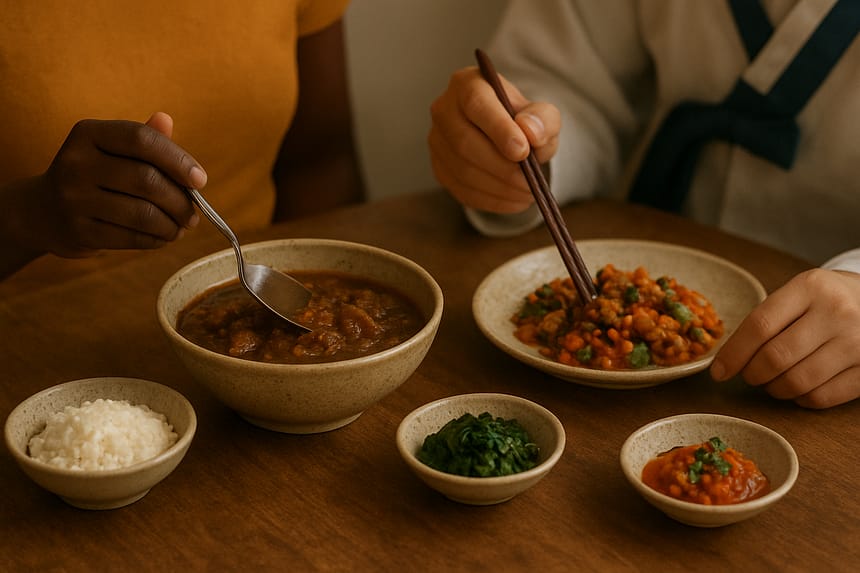I first met Bon Appétit, Your Majesty, on a humid Lagos evening. I was sitting under the yellow swing of my living-room lamp, the evening air heavy with the scent of jollof spices cooling on the stove, when Netflix suggested Bon Appétit, Your Majesty. I was curious: a show that promised romance, royalty, time travel, and food? It seemed indulgent in just the right way. I pressed play.
From the opening sequence, a modern French-cuisine competition won by Chef Yeon Ji-yeong, immediately followed by her being thrust back in time to the Joseon dynasty, something clicked. I recognised in her a tension familiar to many Nigerians: standing between two worlds. For her, the modern and the traditional. For me, the global and the local.
Yeon Ji-yeong doesn’t arrive in the past with anything, well, except for her bag and some ingredients. She also carries techniques, tastes, sensibilities, from fine French cuisine to modern kitchen tools, but in the Joseon court, she must adapt: preserve, translate, invent. The show makes much of ingredients, fresh herbs, seasonal produce, the fallibility of supply lines, and the precision demanded by royalty.
This tension—modernity vs. tradition—mirrors what I see in Nigerian kitchens. My mother’s pepper soup might simmer away in her aluminium pot, blackened from years of use. Smoke rising in curls from my grandmother’s wood fire. But across town, I see sleek international restaurants, imported oil, molecular gastronomy menus, and Instagram food porn. How do you keep your roots while tasting the world?
That’s what Bon Appétit, Your Majesty seemed to say: not that you must choose one or the other, but that fusion, creativity, and mindfulness can live between, even because of the friction. When Ji-yeong takes Korean or Joseon era ingredients and combines them with French techniques—when she thinks about texture, seasoning, the way the cold wind might change taste—it makes me think differently about Nigerian staples. What if my egusi, my bitterleaf and my okra would open up if handled with that reverence? If I thought about their season, their terroir, their stories?
The show is not just about food as spectacle; it is about food as connection. The King, Yi Heon, is both a tyrant with refined taste and a man with old wounds, whose palate becomes a line of communication. Yeon Ji-yeong’s food is a language: it asserts her identity, opens doors, and softens cruelty.
Watching it, I found myself thinking of meals I’d had, those I’d skipped, those I could return to with curiosity. Like the last time I ate amala and ewedu, but ate it fast, almost dismissively, because I was tired or late. What if I instead had allowed myself to taste the earthiness, the interplay of texture, the slippery leaf against the firm amala, the heat of pepper, the cooling effect of palm oil? What if I treated it like a dish I’d been studying?
There’s also the way the drama handles scarcity and seasons, when Ji-yeong must innovate because ingredients are missing or imperfect. That feels very Nigerian: months when certain produce is impossible to get, or when cost makes things prohibitive. Watching the chef build a substitute, or stretch need, or repurpose leftovers, those moments made me stop craving what I cannot access, and instead begin imagining what I can create.
Since watching the show, I’ve begun experimenting. I cook okra in a way I saw Ji-yeong cook bok choy; I try to coax a deeper sweetness out of tomatoes by roasting them longer. I source herbs locally, not seeking perfect, glossy supermarket parsley, but the ones with funny leaves from the back garden, with grit, with scent still in them when I bring them in. I think more about season and origin: Is this spinach grown in the heat of Lokoja? Was this ogbono harvested at peak?
It has become a practice: a Sunday lunch becomes a little ceremony. Grinding pepper by hand, tasting as I add salt, pausing to let aromas rise. Not everything needs to be fussy. Sometimes simple is profound.
Ultimately, Bon Appétit, Your Majesty didn’t just entertain me; it (re)activated something essential: the appetite for adventure, not just in cuisine, but in culture, in identity. The courage to try a recipe I’ve never attempted, to adapt rather than abandon my flavours, to invite others to taste what is home in a way they’ve never tasted it before.
There is a kind of ordinary magic in that. The plates we eat off are as much part of history as the stories we tell. The food we share can bind us to ancestors and yet carry us across oceans. I think now, mindful eating is not ascetic. It is not a refusal. It is gratitude. It’s a rebellion, sometimes, to treat food as art, as a story, as something more than fuel.
So here’s to Bon Appétit, Your Majesty, and to all the dramas, books, and memories that make us hunger. Hunger not just to consume, but to connect. My Nigerian appetite is wetter, richer, more patient. I taste more slowly. I imagine more bravely. And when I cook, I cook with respect, for what came before, for what I can make now, and for what I might yet share.






